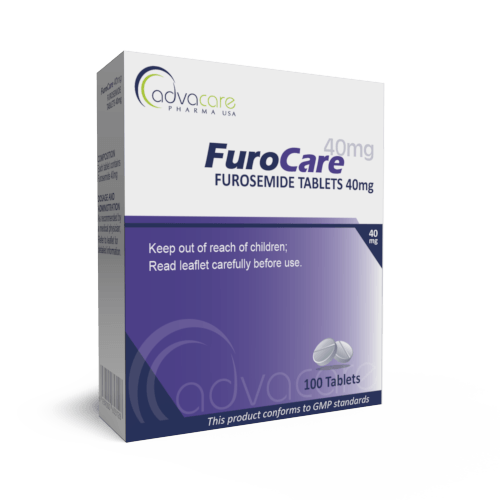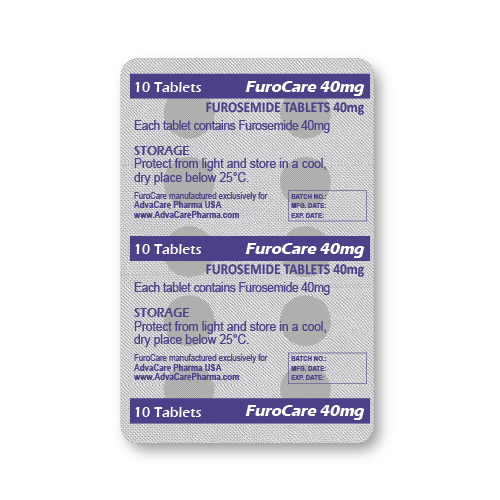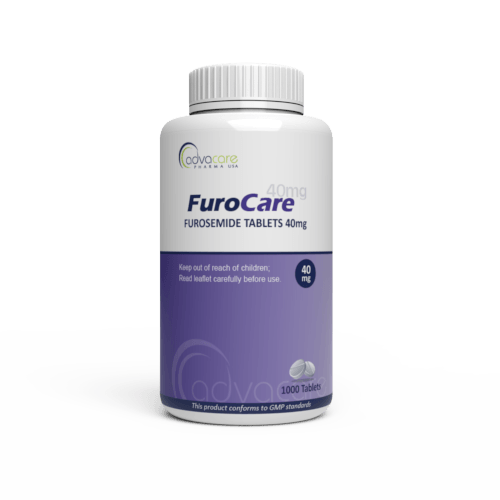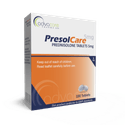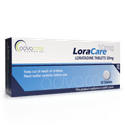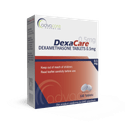- Home›
- Pharmaceuticals›
- Pharmaceutical Tablets›
- Furosemide Tablets
Furosemide Tablets
Dosage
Packaging
What is Furosemide?
Active Ingredients: Furosemide
Furosemide Tablets are a drug used to treat hypertension (high blood pressure) by reducing extra fluid in the body. Fluid retention may be caused by conditions such as heart failure, liver disease, and kidney disease. Reducing excess fluid in the body will lessen symptoms such as shortness of breath and swelling.
Furosemide is a loop diuretic and a derivative of anthranilic acid. It acts on kidney cells to inhibit electrolyte reabsorption and enhance the excretion of water (diuresis). Through the competitive inhibition of sodium-potassium-chloride cotransporters (NKCC2) in nephrons, furosemide increases the excretion of water along with sodium, chloride, calcium, potassium, magnesium, and hydrogen ions.
Furosemide achieves its antihypertensive effects from increasing water excretion, which results in decreased blood volume and lower blood pressure. Furosemide also acts as a vasodilator to reduce blood pressure by expanding blood vessels, which supports its antihypertensive effects.
AdvaCare is a GMP-certified producer and supplier of Furosemide Tablets and Furosemide Injections. This medication is manufactured in our factories in China, India, and the USA. We routinely inspect our manufacturing facilities to ensure our products meet international quality and safety standards.
Why are we a trusted Furosemide manufacturer?
As a reputable Furosemide manufacturer, we are dedicated to ensuring that GMP guidelines and standards strictly apply to the manufacture of our entire range of 200+ pharmaceutical treatments in tablet dosage form.
AdvaCare Pharma is an American pharmaceutical company committed to the manufacture of high-quality, affordable pharmaceuticals for a global market. The extensive international network that we partner with includes pharmaceutical distributors, hospitals, pharmacies, and a variety of other medical institutions. Our vision is to manufacture Finasteride Tablets, and other quality-assured oral solid treatments, that get into the hands of those that need them most.
Uses
What is Furosemide used for?
It is used to treat hypertension and edema associated with:
- heart failure
- liver cirrhosis
- renal disease
- hypertension
How should Furosemide Tablets be used?
This medication is intended to be taken orally. Furosemide Tablets should be taken in the morning with food. As this medication increases thirst and urination, it is recommended to avoid taking this medication within 4 hours of sleep.
What dose should be taken and for how long?
Adults For the treatment of edema, the recommended initial dose is between 20 to 80mg as a single dose. If needed, the same or an increased dose can be given 6 to 8 hours later. Doses can be increased by 20 or 40mg. The maintenance dose can be given once or twice a day for 2 to 4 consecutive days a week. In patients with severe edema, the maximum dose may be titrated up to 600mg/day.
For the treatment of hypertension, the recommended initial dose is 40mg, taken twice a day. The dosage can be adjusted to reach beneficial effects. The minimum required dosage to maintain beneficial clinical responses should be used.
Children (≥ 8 months) For the treatment of edema, the recommended initial dose is 2mg/kg, given as a single dose. If needed, the dosage may be increased by 1 or 2mg/kg and given 6 to 8 hours later. The maximum recommended single dose is 6mg/kg. The maintenance dose should be adjusted to the minimum required dose to maintain beneficial effects.
The dosage is based on medical condition, response to treatment, age, and weight. Refer to a doctor or pharmacist for guidelines on dosage. Do not exceed what they advise.
Who can use Furosemide?
Furosemide can be administered to adults and children (≥ 8 months), but caution is advised for specific groups of patients.
Pregnant Animal studies have shown evidence that furosemide can cause unexplained maternal death and abortions at exceedingly large doses. Human studies are insufficient to rule out risk.
Furosemide should only be used during pregnancy if the potential benefit justifies any potential risk to the fetus and no alternative treatment is available.
Nursing Furosemide is excreted in human milk. Due to the potential for infants exposed to furosemide to develop kidney stones or patent ductus arteriosus, caution should be exercised when administering maternal furosemide.
Pediatric In pediatric patients < 4 years old, treatment with furosemide may result in the development of nephrocalcinosis/nephrolithiasis (kidney stones). In premature neonates, furosemide treatment within the first weeks of birth may increase the risk of patent ductus arteriosus.
Geriatric There are insufficient studies to determine if adults ≥ 65 years respond differently than adults < 65 years old. Renal clearance and the initial diuretic effect of furosemide are decreased in older patients compared to younger adults.
In general, dosing in geriatric patients should be done with caution because of age-related decreases in hepatic, renal, and/or cardiac function and concomitant disease and drug therapy. Close observation is recommended.
How to reduce the risk of side effects with furosemide when taken with other medications?
Reversible or irreversible ototoxic events, such as tinnitus, hearing impairment, and deafness, have been reported with furosemide use. The risk of furosemide-induced ototoxicity is increased in cases of severe renal impairment, exceeding recommended doses, hypoproteinemia, and concomitant therapy with aminoglycoside antibiotics, ethacrynic acid, or other ototoxic drugs.
Concomitant use of furosemide with other medications known to cause ototoxic and nephrotoxic effects, such as cisplatin, may increase the risk of these adverse effects and a furosemide dosing reduction may mitigate this toxicity.
Other warnings
Patients with liver disease or other hepatic dysfunction should be monitored closely when initiating furosemide therapy, as it may result in sudden changes in fluid and electrolyte balance that can lead to hepatic coma, hypokalemia, or metabolic alkalosis.
Patients with severe renal disease should discontinue furosemide if increasing azotemia and oliguria occur during treatment. Reversible BUN elevations may occur from the resultant dehydration and should be monitored closely. Concomitant use with NSAIDs may also result in elevated BUN, creatinine, and potassium levels in those with renal insufficiency. Furosemide is contraindicated in those whose kidneys cannot produce urine (anuria).
Excessive or brisk diuresis from furosemide use can cause dehydration and electrolyte depletion that can lead to blood volume reduction. Patients who are older (≥ 65 years), have cirrhosis, are receiving higher doses, are not adequately replenishing electrolytes, or are concomitantly taking corticosteroids, digitalis, or ACTH are at an increased risk of developing adverse cardiovascular events, such as circulatory collapse, vascular thrombosis, arrhythmias, and embolism. Supplementary potassium may be necessary to prevent or control hypokalemia.
Patients with severe urinary retention from existing conditions (bladder disorders, prostatic hyperplasia, urethral narrowing) require careful monitoring during treatment initiation, as furosemide can exacerbate these symptoms.
Concomitant use of lithium with diuretics increases the risk of lithium toxicity and should be avoided.
Concomitant use of salicylates, which are commonly found in over-the-counter anti-inflammatories, can reduce its renal clearance and increase the risk of salicylate toxicity.
The antihypertensive effects of furosemide may be reduced with concomitant use with indomethacin and sucralfate. Furosemide and sucralfate can be administered at least two hours apart to mitigate these effects. Patients receiving furosemide in combination with these medications should be monitored closely for toxicity and to determine if furosemide treatment is achieving its beneficial effects.
Rare instances of furosemide treatment resulting in asymptomatic hyperuricemia and gout have been reported.
Furosemide can increase blood glucose levels which may exacerbate or precipitate diabetes mellitus.
Furosemide may increase the sensitivity of some patients’ skin to sunlight (photosensitivity) which may exacerbate or activate cases of systemic lupus erythematosus.
Individuals with sulfonamide allergies may also be allergic to furosemide.
Side Effects
As with all pharmaceuticals, some unwanted effects can occur from the use of Furosemide Tablets.
Common side effects include, but may not be limited to:
- frequent urination
- nausea or vomiting
- diarrhea
- constipation
- stomach cramps
- dizziness
- blurred vision
- headache
Serious side effects may include:
- fever
- jaundice
- changes in hearing
- signs of an allergic reaction
- difficulty breathing or swallowing
For a comprehensive understanding of all potential side effects, consult a medical professional.
If any symptoms persist or worsen, or you notice any other symptoms, please call your doctor immediately.
Precautions
Do NOT use Furosemide Tablets if:
- You are allergic to any of the ingredients.
- You have a history of kidney problems.
- You have low levels of potassium, sodium, or other electrolytes. Furosemide can lead to electrolyte imbalances, particularly depletion of potassium. Regular monitoring of electrolyte levels, especially potassium, is advisable.
- You have low blood pressure.
- You are taking potassium supplements or potassium-sparing diuretics.
- You are breastfeeding.
- You have digitalis poisoning or Addison's disease.
Dehydration can result from the excessive diuretic effect of furosemide. To prevent dehydration, patients are advised to ensure they maintain sufficient fluid intake.
For individuals with diabetes, it is crucial to consistently monitor blood glucose levels as furosemide, when administered, has the potential to influence blood sugar levels, necessitating vigilant observation for effective management of the condition.
Before treatment, consult your doctor regarding any medications you are taking to address potential drug interactions.
This medication may not be suitable for people with certain conditions, so it is important to consult with a doctor if you have any health conditions.
Furosemide 40mg: Why the most common dose?
Furosemide 40mg is commonly used for its potent diuretic effect, essential for treating edema and hypertension. Lower doses like Furosemide 20mg may be used initially, while higher doses such as Furosemide 500mg are reserved for severe fluid retention under medical supervision.
References
Efficacy, Safety, and Tolerability of Oral Furosemide Among Patients Receiving Hemodialysis: A Pilot Study
This study evaluates the safety, efficacy, and tolerability of furosemide in patients with hemodialysis-dependent kidney failure.
This is an open-label, single-arm, dose titration pilot study of oral furosemide. It lasted 18 weeks and included patients on hemodialysis who reported at least 1 cup of urine output per day. These patients received a maximum dose of 320mg per day. The safety outcomes were hypokalemia and hypomagnesemia.
This research included 39 patients and the following events occurred: 28 (72%) received the expected furosemide dose, 3 (8%) underwent dose reduction 5 (12%) discontinued furosemide without dose reduction, and 3 (8%) underwent dose reduction and subsequently discontinued furosemide.
The urine output efficacy outcome was achieved by 12 participants (33%) at week 5, 11 participants (33%) at week 12, and 7 participants (22%) at week 18 in the intention-to-treat analysis. In the on-treatment analysis, the urine output efficacy outcome was met by 12 participants (39%) at week 5, 9 participants (35%) at week 12, and 7 participants (28%) at week 18. No safety events related to electrolytes, furosemide levels, or patient-reported hearing changes were observed.
The findings from this study indicate that furosemide is safe and well-tolerated in patients.
Use of Oral Furosemide in Hemodialysis
This study is a crossover, single-blind research that included 34 patients who were randomly assigned to receive 250mg or 500mg of oral furosemide once a day for 1 week.
The results revealed that patients had an increased 24-hour urinary volume by 30%, but the sodium excretion was higher (higher than 200ml) in the patients who received 500mg of oral furosemide.
Only 4 patients experienced adverse events: one had cramps, and all 4 patients had rash and pruritus, but the symptoms improved once furosemide was discontinued.
The conclusion is that oral furosemide is effective, safe, and well-tolerated in patients.
You might be interested in...
Why AdvaCare Pharma?
As an industry leader, we are aware of our responsibility to provide affordable and sustainable solutions to improve healthcare worldwide.
